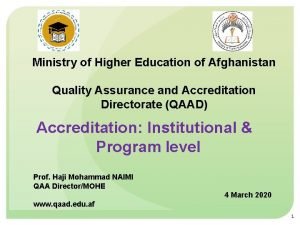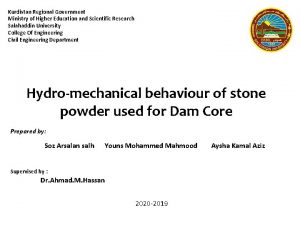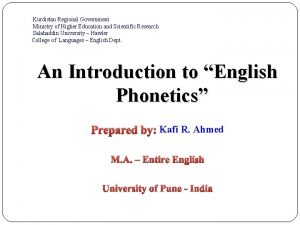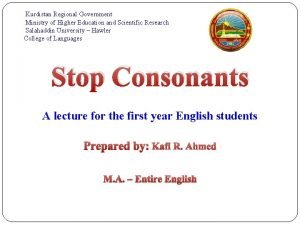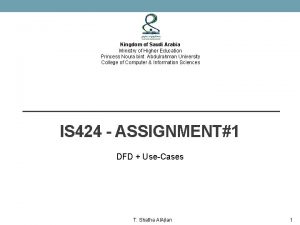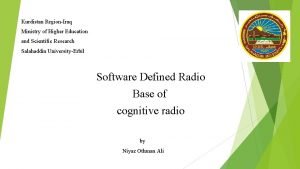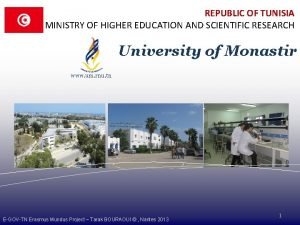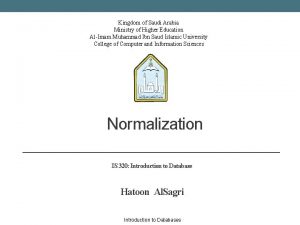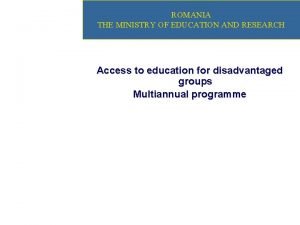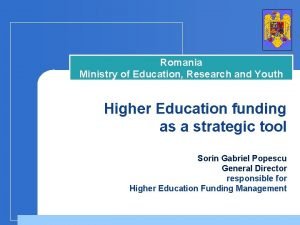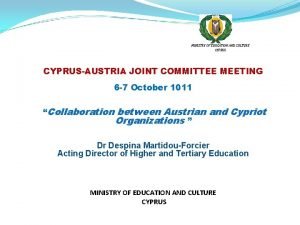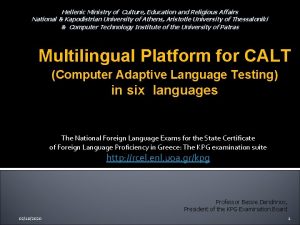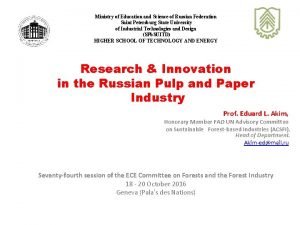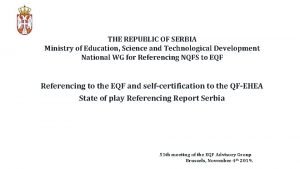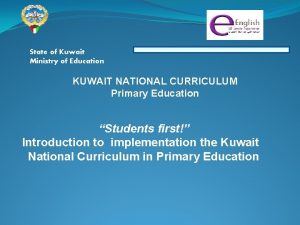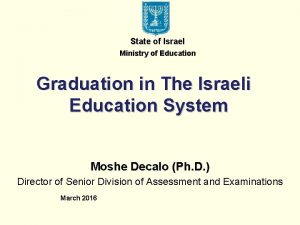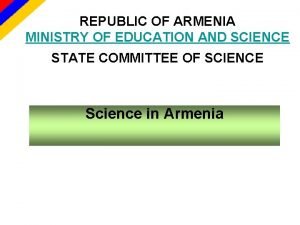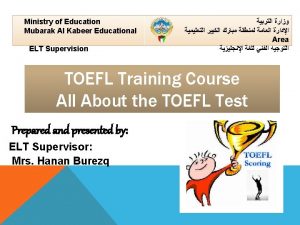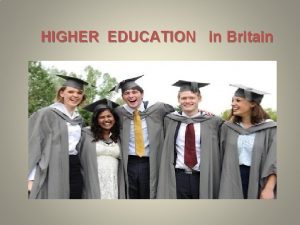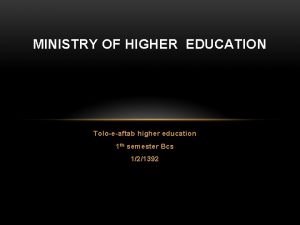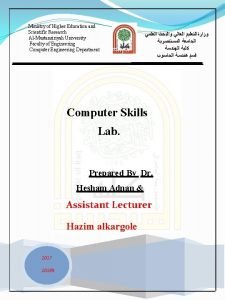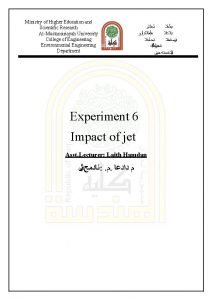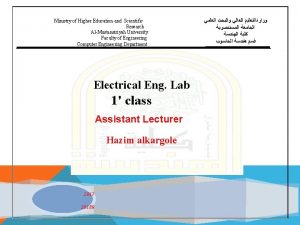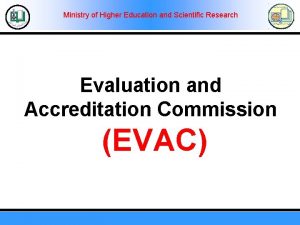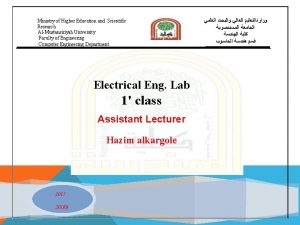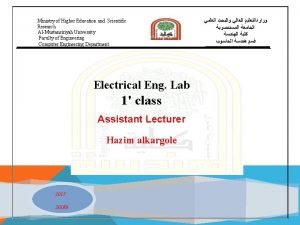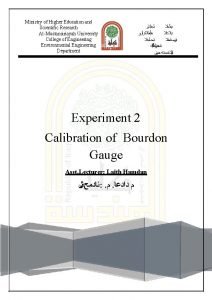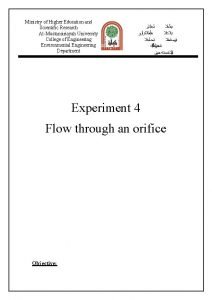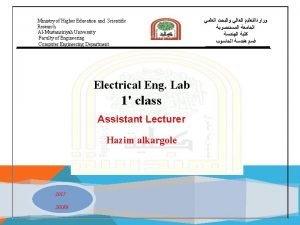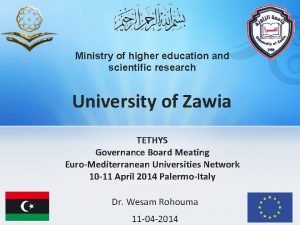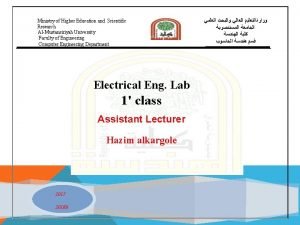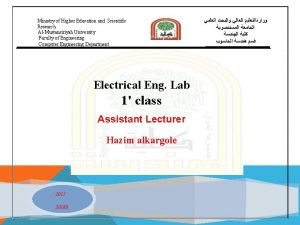Ministry of Higher Education and Scientific research The

















- Slides: 17

Ministry of Higher Education and Scientific research (The New Instruction for Course Book)

1 st page • • Department of Biology College of Science University of Salahaddin Subject: Practical Cell Biology Course Book – (Second Stage of biology Dept. ) Lecturer's name-Khder Hussein Rasul, MSc. Academic Year: 2018/2019

• • 1. Course name: Practical Cell Biology 2. Lecturer: Khder Hussein Rasul 3. Department/ College: Biology/Science 4. Contact: e-mail: khder. rasul@su. edu. krd • 5. Time (in hours) per week: 15 hr. / week (Practical) • 6. Office hours: To be Return to the schedule on the office door • 7. Course code: SBio 202

• 8. Teacher's academic profile: (few paragraphs about your employment history not less than 100 words) • • • I graduated from Salahaddin University in 2007(Ranked 1 st in collage), first, I worked as assistant of biology for two years and assist in practical Immunology lab. , practical virology lab. , practical physiology lab. , practical molecular biology lab. At the end of 2011, I finished my M. Sc. degree in cell biology and start as Assistant Lecturer, teaching practical cell biology and microtechnique. I teach other lessons out side of my college such as physiology and practical animal physiology. For 3 years (Between 2012 -2015) I worked as a Member of the Examination Committee for College of Science. From 2012 until now, I will continue to teach practical cell biology and microtechnique. For one year, I would teach physiology for the 1 st class students of nursing department in Shaqlawa Technical Institute, Shaqlawa, Iraq, and also two years, I would teach practical animal physiology, third stage, college of basic education, Salahaddin university. My scientific title changed to lecturer on September 2016 by submitting 3 research articles. From 2016 until now, Iam working in Zanco Journal as section editor.

9. The Course Keywords Cell, Plasma membrane, cellular respiration, Mitochondria, Techniques , TEM, cell dimension, cell counting and cell death.

10. Course overview: • Its very important to understand the science of cell biology which gives detail information about the cell especially eukaryotic cell, characteristics of the cell, the process which happens with the cell such as cell death and using of the cell and parts of the cell in diagnosis and treat of different diseases, by this way we can find different drugs to increase the life of the cell, to treat the disease on the level of the cell as well as the mechanism of actions of different drugs. • This course is designed to provide information about introduction into the cell biology which it is the science of cell, characteristics of the cell, function and parts of the cell as well as different important techniques which used today for studying the cells. • In this course, we will try to provide a good background about the principles and theories which related to the cell biology, for example endosymbiotic cell theory which related to cell development (formation of eukaryotic cell from prokaryotic cell) and during this course we will provide how the cell develop, formation of different types of cell from the stem cell, how the cell take different lines to produce different cells and which substance has role in taking one specific line to produce one specific type of cell. • Cell biology has a good relationship with other science of biology such as molecular biology, genetics, histology, in cell biology lessons we will learn about general different terms of other fields of biology beside of cell biology and usually we will provide information about different area of biology which related to cell biology.

11. Course objective: • Learn about cytology, structure of the cell, both aerobic and anaerobic cellular respiration, structure and function of different organelles of the cell especially mitochondria and lysosome which the power house and enzyme storage organelles respectively, structure of the plasma membrane and how plasma membrane control the movement of molecules. Cell death includes both apoptosis and necrosis, causes of the cell death and damage of the cell. • Understand historic background of cell biology. • Become familiar with the various sub-cellular structures and organelles inside eukaryotic cells. • To understand more advanced cellular functions, such as regulation of membrane transport, cell signaling, cell death and cellular differentiation. • To gain experience and understanding of microscope (light and electron microscope). • To learn the basic histological techniques for study the tissue and cell. • To study some pathological conformational features of the cell.

12. Student's obligation *Exam policy: Student Should take 2 exams during the course, There will be no make-up exams for absences students without medical report. *Quizzes: student responsible for quizze every week *Seminar: during the course, the student will do seminar *Classroom polices: 1 - Attendance: students are strongly encouraged to attend class on a regular basis, as participation is important to understanding of the material. This is students opportunity to ask questions. Students are responsible for obtaining any information during the class which provided. 2 - Lateness: Lateness to class is disruptive 3 - Electronic devices: All cell phones are to be turned off at the beginning of class and put away during the entire class and don’t allow to use internet. 4 -Talking : During class please refrain from side conversations. These can be disruptive to your fellow students and your professor 5 - No Disrespectful to both the professor and to your fellow students.

13. Forms of teaching The material will be presented at a level suitable for advanced undergraduates by lecturing, discussion, video, power points and seminar. 14. Assessment scheme Sub final marks Laboratory (7. 5 Marks) Exams(at least two) = 5 marks Quizzes, seminar and attendance = 2. 5 marks Final Laboratory (10 marks)

• 15. Student learning outcome: After completion of this course, you will be able to: • • Give information and define different terms of cell biology and about the history of the discovery of the cell and cell development. Describe the different techniques to prepare the specimen for studying the cell by using different types of microscope(especially light and electron microscopes) and use these techniques in private lab. Learn about the different shapes and size of the cell Give detail about the composition of the cell and The function of different parts of the cell Learn about different process which happen with the cell. Provide information about the relationships between the cells

16. Course Reading List and References: • ▪ Color atlas of cytology, histology and microscopic anatomy. • • • ▪ 2003. Wolfgang Kuehnel. 4 th edition. Cell imaging techniques, methods and protocols. 2006 Humana Press Inc. Edited by Douglas J. Taatjes and Brooke T. Mossman. Essential cell biology. 2009. Bruce Alberts , Dennis Bray, Karen Hopkin , Alexander Johnson , Julian Lewis , Martin Raff , Keith Roberts and Peter Walter. 3 rd edition. Cell and Molecular Biology, Concepts and Experiments. 2007. Gerald Karp. 5 th edition. Methods in Cell Biology. 2003. Edited by Leslie Wilson and Paul Matsudaira. The Cell a Molecular Approach. 1997. Geoffrey M. Cooper. Magazines and review (internet) • 17. The Practical Topics and Date (For Practical)

Weeks Week 1 Week 2 Week 3 Week 4 Week 5 Week 6 Week 7 Week 8 Week 9 Week 10 Week 11 Week 12 Week 13 Week 14 Topic Course introduction, history of microscope discovery, Brief history of cell discovery and cell theory. Introduction to Cells: prokaryote and eukaryote cells, general structure of the animal and plant cells and shape of the cells. Cell dimension: ocular micrometer, stage micrometer and determine cell dimension. Cell counting: to determine the abnormality or contamination. Using different way for cell counting such as cell counting by haemocytometer and ocular grid. Lipid Solubility of the plasma Membrane: composition of the plasma membrane. Movement of molecules through and a cross the plasma membrane and test different types and concentrations of alcohols on permeability of the plasma membrane. Extraction of cell membrane lipid: extraction of myelin lipid from neuron. Effect of various temperatures on the membrane nature and activity: investigation the effect of different temperature on beet cell membranes. First exam Techniques used for studying the cell, Transmission Electron microscopy/fixation, postfixation , dehydration, clearing, infiltration and embedding. Techniques continue. Trimming, ultrasectioning and different types of sections, mounting, glass knife, staining using heavy metals. Transmission electron microscope and prepare specimen with negative stain for electron microscope. Mitochondria, ultrastructure, function, different shapes and size, conformational states. Isolation of mitochondria from different cell. Cells which need more energy contain higher number of mitochondria compare to other cells which their activity is low. Cell death: Necrosis and programmed cell death (apoptosis), mechanism, cellular features as revealed by LM and EM. Week 15 Second exam Week 16 Cellular respiration: aerobic and anaerobic respiration and cellular respiration in yeast.

• 19. Examinations: • 1. I identify: include instruments, materials, cell shape…. etc • Identify the following • Answer: Plastic block • • • 2. Compositional: In this type of exam the questions usually starts with Explain how, What are the reasons for…? , Why…? , How…. ? What do you know about osmium tetroxide? Answer: Osmium tetroxide is act as strainer and fixative which use in Routine TEM 3. True or false type of exams: In this type of exam a short sentence about a specific subject will be provided, and then students will comment on the trueness or falseness of this particular sentence. The main part of the cell which determine the cell shape is cytoskeleton. Answer: True 4. Multiple choices: In this type of exam there will be a number of phrases next or below a statement, students will match the correct phrase.

Presentations, documents and videos are available in the following link https: //sites. google. com/a/su. edu. krd/khder-2017/ https: //www. researchgate. net/profile/Khder_Rasul https: //scholar. google. com/citations? hl=en&user=n 5 ZI 67 o. AAAAJ&imq=Khd er+hussein+rasul&btn. A=1 Khder_koiss@yahoo. com Khder. rasul@su. edu. krd

20. Extra notes: • Here the lecturer shall write any note or comment that is not covered in this template and he/she wishes to enrich the course book with his/her valuable remarks.

• 21. Peer review • This course book has to be reviewed and signed by a peer. The peer approves the contents of your course book by writing few sentences in this section. • (A peer is person who has enough knowledge about the subject you are teaching, he/she has to be a professor, assistant professor, a lecturer or an expert in the field of your subject).

Thanks for your listening
 Ministry of higher education (afghanistan)
Ministry of higher education (afghanistan) Ministry of education krg
Ministry of education krg Ministry of higher education kurdistan
Ministry of higher education kurdistan Kurdistan higher education
Kurdistan higher education Ministry of higher education saudi arabia
Ministry of higher education saudi arabia Face application
Face application Ministry of higher education tunisia
Ministry of higher education tunisia Ministry of higher education saudi
Ministry of higher education saudi Ministry of education romania
Ministry of education romania Ministry of education romania
Ministry of education romania Ministry of education and culture cyprus
Ministry of education and culture cyprus Hellenic ministry of education and religious affairs
Hellenic ministry of education and religious affairs Ministry of education and science of the russian federation
Ministry of education and science of the russian federation Ministry of education serbia
Ministry of education serbia Kuwait ministry of education
Kuwait ministry of education Israeli ministry of education
Israeli ministry of education Ministry of education armenia
Ministry of education armenia Ministry of education mubarak al kabeer
Ministry of education mubarak al kabeer
